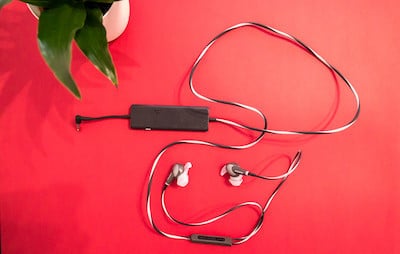
Headphones are a lot like mobile phones – a lot of size variation and features but at the core performing the same basic function. What you really want from a good pair of headphones when traveling is excellent sound quality, particularly in noisy environments like airplane cabins. Lightweight reliability in a discreet package are all also assets the Bose QuietComfort 20 Noise-Cancelling combines elegantly.
What There Is To Love (Hint: A Lot)
Although I’ve been using the QuietComfort 20 headphones as my primary pair for the past few years, before I first put them on I was skeptical. Mostly because these aren’t cheap headphones coupled with the fact that I thought all headphones are pretty much the same. They are not.
First let’s start with the earbuds themselves; Bose has shaped the QuietComfort silicone ear tips in an unorthodox design to maximize comfort. These replaceable ear tips (the QuietComfort come with two pair) make the headphones themselves barely perceptible after a few minutes while at the same time doing an excellent job of cutting out ambient noise. (Not to be mistaken with the actual active noise-cancelling feature. More on that in a bit.)

Another small feature I wouldn’t have noticed if I didn’t put my own QuietComfort pair through traveler hell, is the small metal band around where the headphone cable meets the earbud. Those of you who’ve ever had this happen to a Macbook charger probably know that a lot of gadgets die because of cable fray. You end up spending a lot of money to replace something that an extra millimeter or two of rubber could have prevented if the manufacturer had bothered to design something you’re actually going to use. Bose has made the QuietComfort 20 to last, here, take a look at mine after more than 45,000 miles of flights:

On the other end of the cable though is the most enticing feature of the QuietComfort 20: electronic noise cancellation.
Once You Experience Noise-Cancelling You Won’t Fly Without It
The small little rectangular block at the base of the QuietComfort 20 headphone jack is actually a rechargeable battery pack, powering the noise-cancelling feature. Basically, noise cancellation reads the sound waves around you and eliminates them by producing inverse waves. Understanding how it works isn’t really important to know that once activated, the music coming through your headphones now sounds like you’re listening in a quiet room, even if you’re in a jumbo jet at cruising altitude.
Noise cancellation isn’t perfect, there is a slight buzz and perceivable pressure, plus really high pitch noises seem not to get blocked as easily. The low hum of train wheels on tracks however, perfect.
The lithium ion battery lasts 16 hours when charged full, a process that takes about 2 hours. Unfortunately the battery isn’t replaceable but Bose says you can get 3 years of continuous use before you’ll notice a decrease in battery life. Of course, you don’t need noise cancelling to use these headphones but after getting use to it, you’ll find flying without it on nearly unbearable.
A Price For The Peace
Though the QuietComfort 20 aren’t waterproof or specially designed for use during sports, I’ve found them to be decent jogging headphones. Additionally, Bose has done a good job of adding practical functions to the QuietComfort. For instance it’s got a high quality microphone, embedded volume control, plus a little button for a fast way to temporarily stop noise cancelling (like when you need to hear a boarding call). Voted the 2015 Traveler’s Choice by Tripadvisor, these Bose headphones can also eliminate ambient noise when nothing is playing; they don’t even need to be plugged in. You can get better naps on bus journeys, concentrate on work, a good book, or pensively zone out as you watch the sunset on a train ride across England.

Yes, the Bose QuietComfort 20 are expensive at $299, but for a product this well built that will get – and can handle – heavy use, it’s worth spending more for the QuietComfort than 3 other pair of cheaper earbuds over the same time. Simply put, the Bose QuietComfort 20 Acoustic Noise Cancelling are the best headphones a traveler can buy today.













It’s been awhile since I last visited your blog (was blogging at different website then) – wow your topic has been very diversifed since the last time I been here, Anil! Luckily you haven’t change your display photo in FB or else I will think I arrived at new blog.
Gotta spend some time reader back all your older posts!
-Daniel